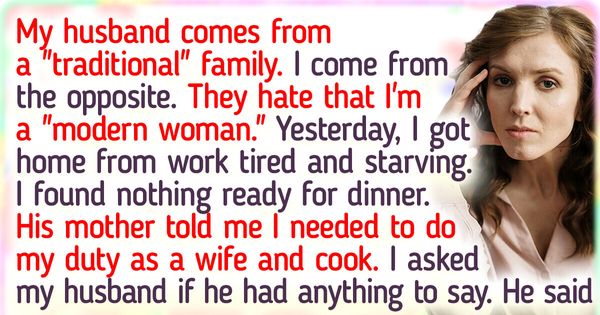As a modern woman, nothing could have prepared me for the day my husband’s family suggested I needed to embrace the role of a “traditional” wife. The shock I felt was overwhelming, and it forced me to confront deep-seated expectations and cultural norms that I had never fully considered.

You see, my husband comes from a traditional family where his mother is a stay-at-home wife and his father is the sole provider. In stark contrast, my own mother instilled in me from a young age the importance of never being financially dependent on a man. I believed in equality and sharing responsibilities with my partner.
Fortunately, my husband has worked hard to unlearn the values he grew up with. He pulls his weight at home, is an engaged father, and a genuine partner. However, he still places an excessive amount of importance on his family’s opinions. I understand the desire to make one’s parents proud, but sometimes it can go too far.
Recently, my in-laws came to stay with us for two weeks. Our daily routine usually involves me preparing breakfast, everyone having lunch at work or school, and my husband cooking dinner. We even have a cleaner to help with household chores, but she was on holiday, so we were all pitching in with the cleaning. This system has always worked for us.
However, my in-laws despise my “modern” approach to life. They disapprove of the fact that I work, that I don’t find my sole purpose in being a wife and mother, and that my husband shares household responsibilities. We had a frank discussion early on where I set my boundaries and made it clear that I wouldn’t tolerate criticism about how I live my life in my own home. I respect their ways when I’m a guest in their home, so I expected the same in return.
Yesterday, after a long day at work, I came home exhausted and hungry. I usually arrive around 6:15 or 6:30 PM, and we eat dinner at 7 PM. However, when I came downstairs after taking a quick shower, I found that nothing had been prepared.
I asked my husband about it, but he avoided eye contact. To my surprise, it was my mother-in-law who answered, saying that he hadn’t cooked anything because I needed to fulfill my duty as a wife and cook for my family. I was taken aback, and my frustration grew.
Feeling neglected, I decided to order takeout, served myself and our children, and we sat down to eat. Only after serving themselves did my husband and his parents join us.
To add insult to injury, my mother-in-law continued to criticize me, calling me a failure. I couldn’t keep quiet anymore and asked my husband if he had anything to say. Much to my disappointment, he sided with his mother, suggesting that I should act “more like a proper woman” and “take better care of my home and children” according to tradition. He believed that tradition exists for a reason, and it hurt that I thought I was too good for the way he was raised.
In the heat of the moment, I may have said some things I regret. I told him that traditional values wouldn’t allow a man earning 35k to support a family of five, and that his sexist views were unacceptable. He looked hurt, with tears welling up in his eyes, and excused himself from the table.
Looking back, I realize that this experience has highlighted the importance of open communication and mutual understanding in a marriage. We both need to have a serious conversation about boundaries, expectations, and the pressures we face from our families. It’s crucial that we find a balance between honoring tradition and embracing the values that matter most to us.
At the end of the day, love and respect should always take precedence over outdated expectations.





